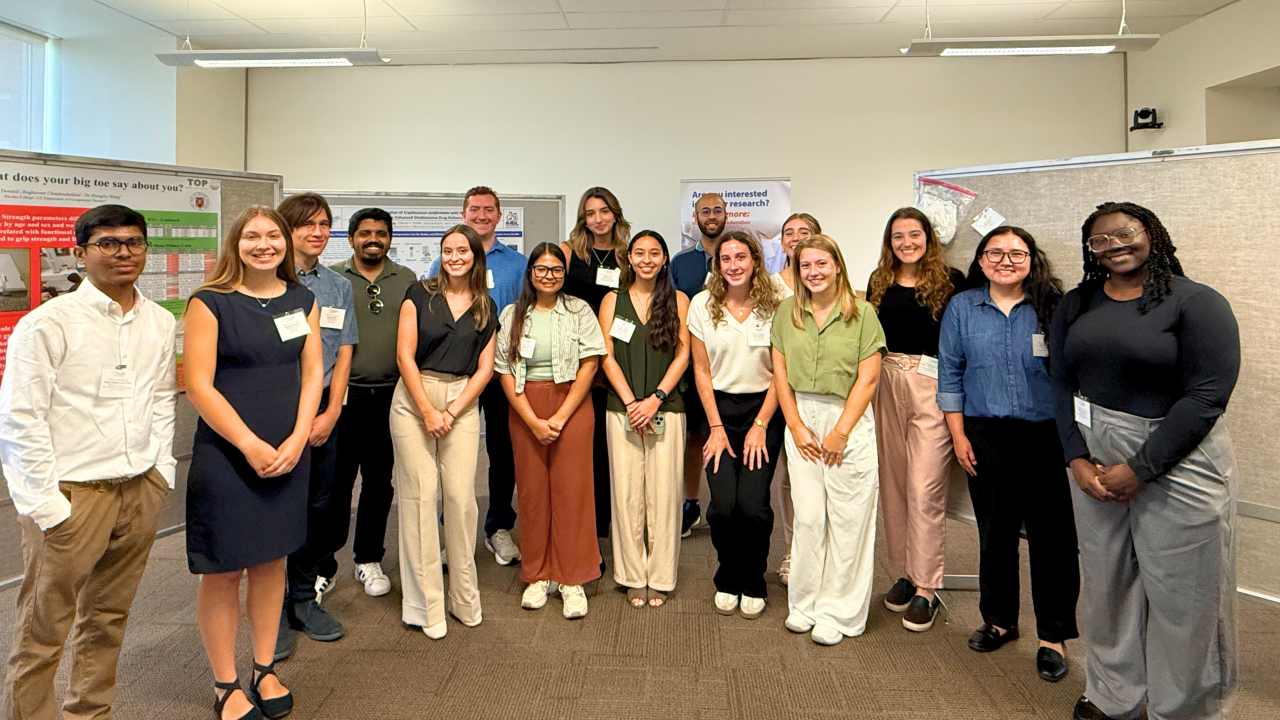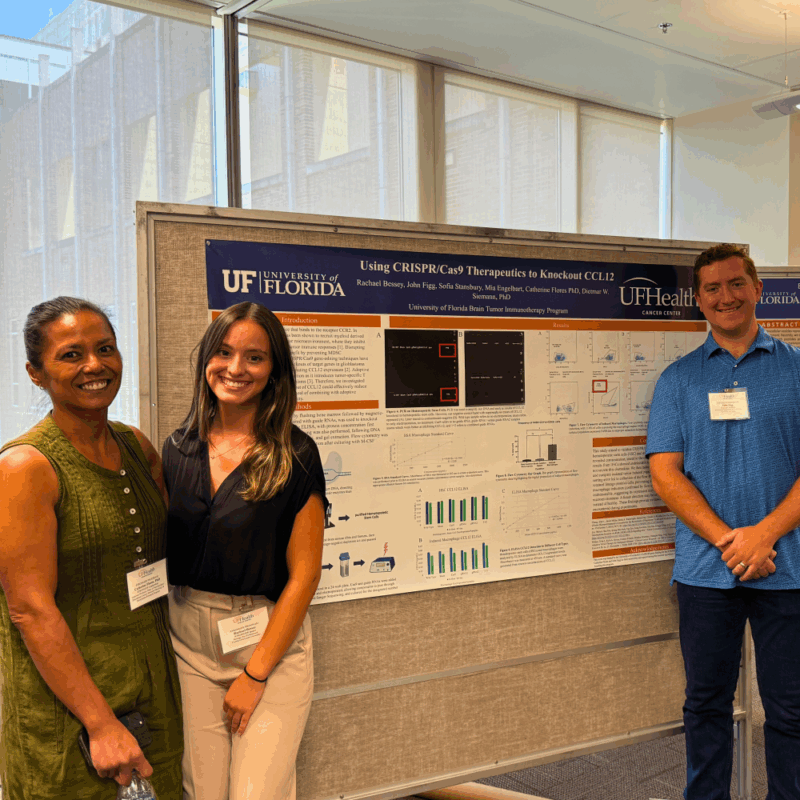
NCI-funded Cancer Research Internship Positions Undergraduates for Success
UF Health Cancer Center Cancer Training and Education Program shared a post on LinkedIn:
“Hats off to our outstanding class of 2025 STRONGER summer cancer research interns!
This year, our immersive 12-week STRONGER program obtained funding from the National Cancer Institute (NCI) and expanded nationally. Nine undergraduates had the opportunity to develop their skills as young scientists through training with accomplished University of Florida cancer investigators.
Meet our interns and read all about the program!
NCI-funded cancer research internship positions undergraduates for success
Attending a small college in Pennsylvania, Hannah Skwarek had little exposure to a full-fledged cancer research lab.
‘Being in a lab that has a PI and grad students is something that I am not able to experience at my school back home. I learned a lot from being here and getting to experience a lab culture was really helpful.’ – said Skwarek, one of nine undergraduates who participated in the UF Health Cancer Center’s 2025 STRONGER summer internship (Summer Training in Research and Oncology for the Next Generation of Researchers).
Skwarek worked in the lab of UF Health Cancer Center member Matthew Merritt, Ph.D., where she studied cell metabolism in pancreatic cancer. She gained valuable experience with leading-edge technology and software, including the Advanced Magnetic Resonance Imaging and Spectroscopy Facility.
This year, the immersive 12-week STRONGER program obtained funding through a National Cancer Institute (NCI) training grant and expanded nationally. Undergraduates develop their skills as young scientists through training with accomplished UF cancer investigators. Crucially, the program helps students like Skwarek take the next step in their careers.
‘My PI is able to write a letter of recommendation for me now, which is game-changing,’ said Skwarek, a rising senior who plans to apply to graduate programs in cancer biology.
STRONGER is geared toward students from smaller colleges and universities that may not have robust research infrastructure, said Dietmar Siemann, Ph.D., the Cancer Center’s associate director for education and training.
‘We want to help students become competitive applicants for graduate school and position them for careers in cancer research,’ he said.
The internship takes a novel approach by inviting UF graduate students and postdoctoral trainees to lead the cancer research projects and serve as direct mentors. The trainees submitted grant proposals for summer research projects and presented their projects during three-minute oral presentations at the beginning of the program. A speed-networking session allowed the interns to learn more and match with a mentor.
This format enables the interns to gain hands-on research experience while working with a near-peer, and it benefits the mentors by strengthening their teaching and project management skills.
‘As a mentor, you have to find a way to effectively communicate what you’re working on in a way that’s digestible and that someone who may not share your educational background can understand,’ said Jack Figg, an M.D.-Ph.D. student and UF Health Cancer Center Predoctoral awardee.

STRONGER intern Rachael Bessey researched CRISPR techniques in glioblastoma with faculty mentor Catherine Flores, M.D., Ph.D., and grad student mentor Jack Figg.
Figg mentored intern Rachael Bessey, a rising senior at Florida Gulf Coast University, on a project using CRISPR technology in glioblastoma. They worked with faculty mentor Catherine Flores, M.D., Ph.D., who said the program was beneficial for everyone in the lab.
“When someone asks questions sincerely in ways you don’t necessarily think about, it’s very refreshing to have that alternative thought process,” Flores said. “It’s fun having young people around who are genuinely interested and bring enthusiasm to science.”
Interns had the opportunity to design experiments, analyze results and present data. They received thorough training in basic and translational cancer research, and completed a seminar series led by UF faculty, staff and UF Health Cancer Center ambassadors on lab essentials, research skills and professional development. At the end of the program, the interns presented their research posters, fielding questions and discussing next steps.
‘I feel like I really know how research is conducted in the world, which I didn’t before. I didn’t understand how research was done large scale — how you go from drug development to clinical trials, the difference between M.D. and M.D.-Ph.D., what do med students do when they do research, what do Ph.D. students do.’ – said intern Faith Romero, a premedical student at Ave Maria University.
For her project, Romero researched methods of tissue sampling for genetic testing for pancreatic and biliary cancers under the mentorship of UF Health interventional gastroenterologist Aleksey Novikov, M.D., and internal medicine resident Lindsey Creech, DO, MBA, MPH.
Romero had opportunities that are seldom available to undergraduate students. She shadowed a gastroenterologist, observed a surgery, met patients in the clinic, participated in the patient chart process through EPIC and learned statistical methods.
‘I had the chance to really understand every part of my research project and I was only able to do that at an institution like UF. It’s really cool when you can see how research can directly affect patients. This is the research I would most likely do in med school, and it sparked my interest even more.’ – Romero said.
2025 STRONGER interns
- Isabella Alves: Discovery of AAK1-targeting PROTAC degraders (Mentors: Kuntala Dey; Guangrong Zheng, Ph.D.)
- Rachael Bessey: Using CRISPR/Cas9 therapeutics to knockout CCL12 (Mentors: Jack Figg; Catherine Flores, M.D., Ph.D.)
- Natalie N. Campos: Evaluating how the acidic pH impacts T cell activation to design extracellular vesicle immune agents (Mentors: Zachary Greenberg; Mei He, Ph.D.)
- Diego Donald: Feet Buzz: What Does Your Big Toe Say About You? (Mentors: Raghuveer Chandrashekhar; Hongwu Wang, Ph.D.)
- Audrey Gonzales: Functionalization of Cryptococcus neoformans with nanoparticles for enhanced glioblastoma drug delivery (Mentors: Clinton Smith; Jamal Lewis, Ph.D.)
- Dylan Pena: Mapping the phenotypic landscape of heart dysfunction in the context of cardio-oncology (Mentors: Camara Casson; Meghan Ferrall-Fairbanks, Ph.D.)
- Faith Romero: Assessing endoscopic ultrasound (EUS)-guided tissue sampling techniques to optimize next-generation sequencing (NGS) yields in pancreatic masses (Mentors: Lindsey Creech, D.O.; Aleksey A. Novikov, M.D.)
- Hannah Skwarek: Tracing alanine metabolism in pancreatic ductal adenocarcinoma (PDAC) using [13C3]alanine in MIA PaCa-2 cells (Mentors: Manoj Madheswaran, Ph.D.; Matthew E. Merritt, Ph.D.)
- Isabelle Wells: Exploring therapeutic potential of tomato-derived extracellular vesicles (Mentors: Hillary Jean-Pierre; Mei He, Ph.D.)
Learn more about the STRONGER program.”
More posts featuring UF Health Cancer Center Cancer Training and Education Program on OncoDaily.
-
Challenging the Status Quo in Colorectal Cancer 2024
December 6-8, 2024
-
ESMO 2024 Congress
September 13-17, 2024
-
ASCO Annual Meeting
May 30 - June 4, 2024
-
Yvonne Award 2024
May 31, 2024
-
OncoThon 2024, Online
Feb. 15, 2024
-
Global Summit on War & Cancer 2023, Online
Dec. 14-16, 2023
